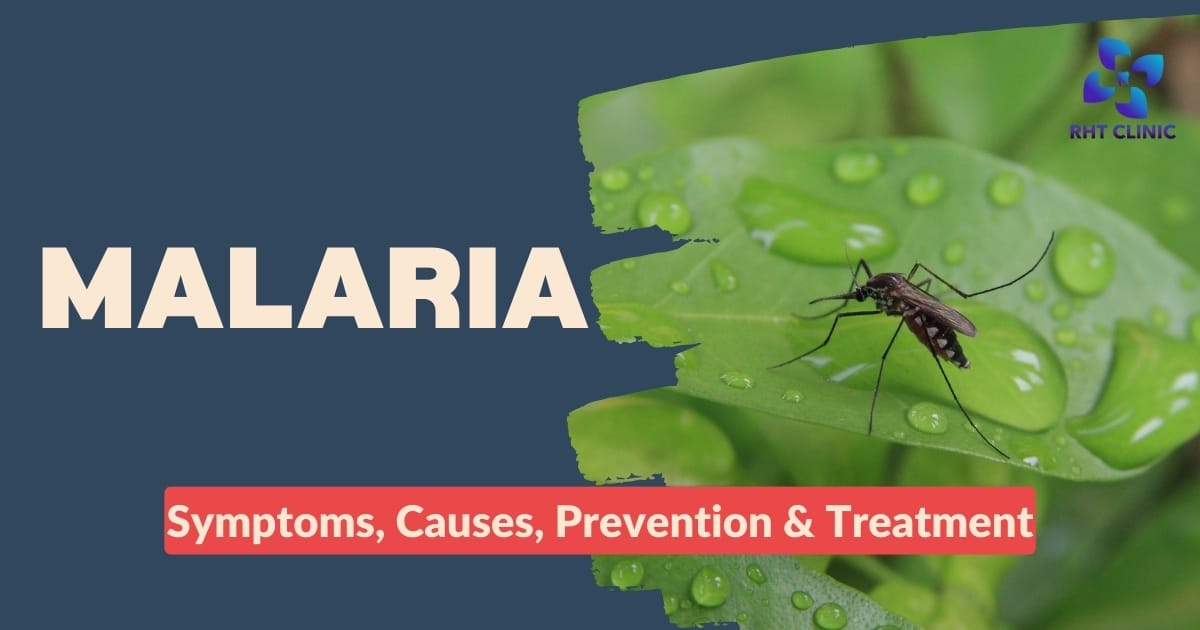
Malaria: Symptoms, Causes, Prevention & Treatment
Malaria has been one of the oldest and deadliest diseases known to humankind. Even today, it continues to affect millions of people worldwide, especially in tropical countries like India. At RHT Clinic, Malviya Nagar, Delhi, our goal is to spread awareness so you and your family stay protected from this mosquito-borne illness.
What is Malaria?
Malaria is a serious parasitic infection caused by Plasmodium parasites, transmitted through the bite of the female Anopheles mosquito. Unlike dengue, which is viral, malaria is parasitic in nature.
There are different species of Plasmodium that infect humans:
- Plasmodium falciparum – most severe and life-threatening
- Plasmodium vivax – common in India, can relapse even after treatment
- Plasmodium malariae – less common, but causes long-lasting infection
- Plasmodium ovale & knowlesi – rare but possible
Symptoms of Malaria
Symptoms usually appear 10–15 days after the mosquito bite, but they can sometimes take longer.
Common Symptoms:
- High fever with chills and shivering
- Sweating after fever subsides
- Severe headache
- Nausea and vomiting
- Muscle and joint pain
- Fatigue and weakness
Severe Symptoms (especially due to P. falciparum):
- Anemia due to destruction of red blood cells
- Jaundice (yellowing of skin and eyes)
- Breathing difficulties
- Seizures or confusion
- Organ failure in extreme cases
How Does Malaria Spread?
- Spread only through bites of infected Anopheles mosquitoes.
- These mosquitoes bite at night, unlike dengue mosquitoes that bite during the day.
- They breed in dirty water and puddles – drains, marshy areas, and stagnant water bodies.
Prevention
At RHT Clinic, we emphasize prevention as the strongest shield
Mosquito Control:
- Do not allow stagnant water around your home.
- Use mosquito nets, especially while sleeping.
- Spray insecticides in breeding areas.
Personal Protection:
- Wear long sleeves and trousers in the evening and at night.
- Apply mosquito repellents on exposed skin.
Community Efforts:
- Support local drives to clean drains and water-logged areas.
- Raise awareness in schools, offices, and neighborhoods.
Treatment of Malaria
Unlike dengue, malaria has effective treatment available.
- Antimalarial drugs such as chloroquine, artemisinin-based therapies, or other prescribed medicines depending on the parasite strain.
- Hospital care may be required for severe malaria.
- Supportive treatment for fever, dehydration, and anemia.
- Never self-medicate. Proper diagnosis with a blood test is essential to confirm malaria and begin the right treatment.
Why Malaria Still Matters in India
It remains a major public health challenge in tropical regions.
- P. vivax malaria in India often relapses if not treated fully.
- Climate change, unplanned urban growth, and waterlogging after rains increase mosquito breeding.
Final Word by Dr. nadeem Ahmed
Malaria is preventable and treatable — but only if identified early. If you or your loved ones have recurrent fever with chills, don’t delay. Visit RHT Clinic, Malviya Nagar, Delhi, for expert diagnosis and care.
Together, with awareness and timely action, we can build a malaria-free community.

0 Comments on “Malaria: Symptoms, Causes, Prevention & Treatment”